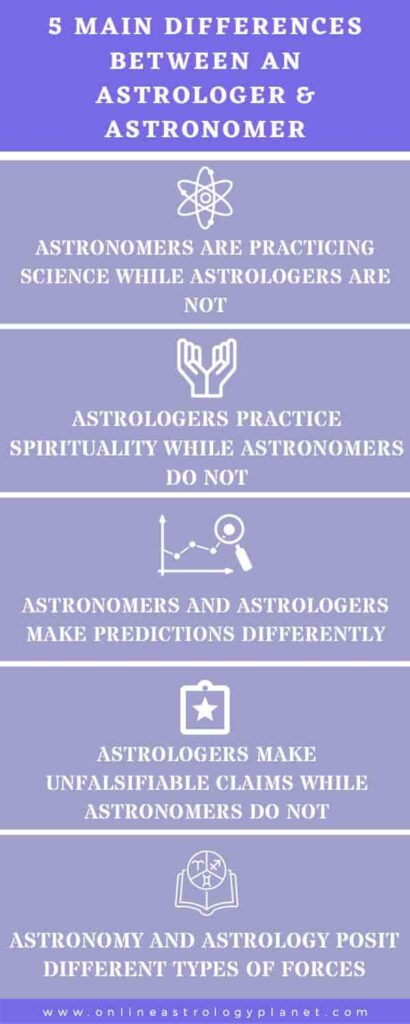If you want to know the main differences between an astrologer and astronomer, then this post is for you.
Astronomers and astrologers have had to deal with being confused for one another since they were both terms. Still, both groups will be quick to tell you, they aren’t the same thing. While they both sound the same and deal with space they couldn’t be farther apart in other ways. So what is it exactly that makes astronomers and astrologers different from each other?
Astronomers and astrologers have different purposes for analyzing the night sky. Astronomers study all objects and phenomena outside of the earth’s atmosphere to further scientific research and our understanding of the universe. Astrologers study the same bodies to predict fortunes.
If you never want to mistakenly say astrologer when you mean astronomer (and vice-versa), we’ve got you covered. Below we’ll break down what each discipline is and the 5 biggest differences between them. We’ll even provide you with a mnemonic trick you can use to remind yourself which is which in case you forget.
Article Contents
What is Astronomy Vs Astrology?
It’s easy to confuse astronomy and astrology with one another not only because they both deal with similar subjects, but also simply because they’re similar sounding words. They’re only two letters apart from being the same word.
The reason why they both sound similar is because the astro part of astrology is a form of the Greek “astron,” or star. It’s the same with astronomy as well. Astronomy traces its roots back to the Greek astronomus, while astrology simply goes back to astron.
Before we break down why the actual practices of astronomy and astrology are different, let’s first define our terms so we’re clear on what each one is in and of itself.
What Does an Astrologer Do?
Astrologers examine the stars, planets and other celestial bodies to predict the fortune of an individual person. They print horoscopes online and in newspapers that predict your fortune based on your birth month and the alignment of celestial bodies.
The key word there is fortune. Not the future. While technically they are predicting the future of your fortune, they aren’t usually predicting the future in the sense of telling you what will happen to you tomorrow in precise detail. Rather, they may make a general prediction on what kinds of things to watch out for or embrace during a given time frame (i.e. day, week month).
Astrologers have a rich history that dates all the way back to ancient babylon. They have been passing down their craft for a very long time.
What Does an Astronomer Do?
Astronomers use the scientific method to conduct research on everything that isn’t on the planet earth. They study objects and phenomena in space to get a better understanding of the universe and how it works on a naturalistic level. They do not deal with the spiritual, as it is outside their purview.
As far as careers go, there are actually a surprising number for astronomers. They can work everywhere from academia to the private sector. Below we’ve listed just a few examples of careers for astronomers that span the multiple sectors:
- University Professors: Professors often both teach astronomy to graduate and undergraduate students, as well as conduct research for their university.
- NASA: Many astronomers work for government agencies. The largest of these concerned with space is the National Aeronautics and Space Administration.
- Spacex: Private companies like spacex now hire astronomers to work on their space missions. As time progresses, more and more jobs like these are expected to start popping up.
- Public figures/Science educators: Finally, astronomers can work for the public at large by becoming public figures that interpret science for the public. Neil Degrasse Tyson is a great example of this. He is an astrophysicist (a branch of astronomy) that regularly uses his time to make science digestible to average people without a background in it.
It’s also important to note that many astronomers work in different career sectors simultaneously. They don’t always have to choose just one.
What is the Difference Between an Astrologer and an Astronomer?
The primary difference between an astronomer and an astrologer lies in the purpose behind what they do. They both study the movement of stars, but astrologers do it to predict the future of people, while astronomers do it simply to advance science and our understanding of how the universe works
A great way to remember which is which is to take advantage of a mnemonic device using the N and L in each word respectively. Because the two words are only two letters apart, remember to pay attention to what the middle letter of each word is.
Just pretend the N in astronomers stands for “NASA”. As we stated previously, NASA is partially made up of astronomers and they use science to study space. If you can’t remember off of the top of your head which is which, just look at the middle letter that is different in both words and you will remind yourself.
For astrologer’s on the other hand, pretend the middle letter L stands for “lives.” As in this is the practice that has to do with our day to day lives. This one isn’t quite as straightforward as NASA, still as long as you at least remember one of them you can guess the other through a the briefest processes of elimination.
The 5 Main Differences Between an Astrologer and Astronomer

1. Astronomers are Practicing Science While Astrologers are Not
Astronomy is a legitimate branch of the sciences. As we mentioned previously, it has to follow the rigorous standards of the scientific method. After that, all findings have to be peer reviewed by other scientists. Finally, more data must be gathered to see if the results of the study can be replicated by other researchers from independent institutions.
Astrologers on the other hand, are not practicing science. In fact, one of the largest criticisms leveled at astrology is that it is a pseudoscience, with no evidence to back up its predictions. That said, there are others who argue it’s no longer really meant to be a science, but instead a form of spiritual practice and/or entertainment.
2. Astrologers Practice Spirituality While Astronomers Do Not
Astrology is heavily tied into spirituality. While they can track the objective movements of celestial bodies, there is a subjective nature to the way they interpret the meaning of those movements. Instead of relying on human reason, astrologers rely on their spiritual practices to confirm their predictions.
Many people also use the predictions of astrologers in horoscopes as a point of comfort for themselves when they are going through a hard time. It can give them confidence they are prepared for the challenges ahead or ease their mind if they feel stuck in life.
3. Astronomers and Astrologers Make Predictions Differently
There is a common misconception that the difference between astronomers and astrologers is that the latter makes predictions and the former doesn’t. While it’s easy to see how someone would come to that conclusion, it isn’t entirely true.
Astronomers do in fact make predictions. They just make different types of predictions than astrologers. The predictions of astrologers are assumed to be true based on the spiritual beliefs they hold. Astronomers on the other hand, simply make predictions so they can test whether or not their hypothesis was correct.
For example, an astronomer may predict where a comet will be based on a number of factors like how large they believe it is and the materials they think it contains. They can test if they were correct by seeing if the comet ends up where the math says it should be, when it should be there, given all the variables.
In essence astronomy uses predictions as an objective measure of whether or not they were correct in their hypothesis. Astrology on the other hand doesn’t use predictions to test itself, but rather generates them for those who already believe in their validity.
4. Astrologers Make Unfalsifiable Claims While Astronomers Do Not
When something is “unfalsifiable,” it means that there is no way to really disprove it. Most horoscope readings can be discounted as having been misinterpreted if the predictions they make don’t seem to come true.
In fact, whether or not those predictions are accurate is largely subjective, since they don’t make many precise claims. Because spiritual forces are involved in astrology, they can be used to explain away any empirical evidence against their claims, or a lack of empirical evidence for them.
That’s not necessarily because spiritual claims aren’t valuable, just that they aren’t testable using scientific processes. Science is by definition the study of the natural world.
To use the scientific method, one’s hypothesis must be falsifiable. Otherwise there is no way to test it. Therefore, in astronomy it is extremely important that
5. Astronomy and Astrology Posit Different Types of Forces
There are forces in both astronomy and astrology, but they are of a very different kind. Astronomy is concerned with the 4 fundamental forces of nature; electromagnetic, gravitational, strong and weak.
Some astronomers have even posited the discovery of a fifth fundamental force that is involved in the surface tension created by dark energy. There is still a way to go before astronomers have a better understanding of this force and dark energy itself however.
Turning to astrologers, we see a spiritual force rather than a scientific one. This mysterious force is what connects a soul’s fortunes to the movement of celestial bodies. The force cannot be tested scientifically, but its effect can be experienced according to astrology.
So Really, What’s the Difference Between an Astrologer and Astronomer?
Astronomers and astrologers both study space, but the latter does it because of their spiritual beliefs while the other does it to find natural explanations for observations. Astrologers will use the alignment of the stars to write horoscopes that predict the fortunes of people based on their sign. Astronomers will make predictions based on observations and test them for accuracy.
At the end of the day, they really both have a different purpose and a different place in culture. With astronomy, we can make advances in our understanding of how the universe works that could have implications for everyone. At the same time, whether you believe astrology is a pseudoscience or not, there are people who take inspiration from it and get personal value.




